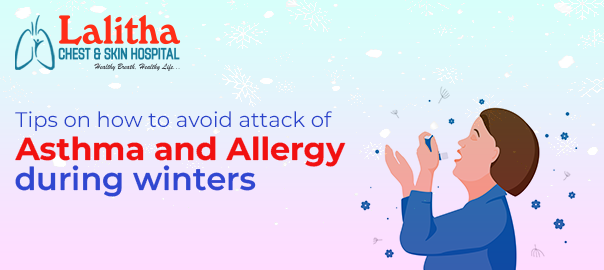In addition to the chilly cold weather, winters also bring the risk of allergies and asthma, especially in Karimnagar. We often encounter and treat a lot of cases of asthma and allergies during the winter at our chest and skin clinic in Karimnagar.
“Most asthmatics are sensitive to cold air, which can worsen their symptoms. The dust mites, mold, and pet dander also become more concentrated during the winter in closed environments, increasing the allergy flare-ups,” says the asthma specialist in Karimnagar, Dr. Raj Kumar Korra.
So, how should patients suffering from allergies or asthma protect themselves from the increased risk in the winter? Pulmonologist Dr. Raj Kumar Korra at Lalitha Chest and Skin Hospital in Karimnagar is here to answer.
With his insights, we delve into the reasons for the increased risk and then provide four tips to help reduce allergy and asthma risks during winter. Read on:
Why do asthma and allergy cases rise in winter?
The airways in the lungs are protected by a layer of mucus, which evaporates when we inhale the cold air in the winter. This lack of mucus irritates the airways and inflames the lungs, making it harder to breathe and triggering asthma symptoms in patients already at high risk. Chest pain, coughing, wheezing, and chest tightness are some common asthma symptoms that may further exacerbate in the winter, according to asthma specialist Dr. Raj Kumar Korra.
Winters are also the time when everyone spends more time indoors than outdoors. Consequently, allergens like dust mites, mold, and pet dander also tend to thrive in the warm indoors of the winter. So, unfortunately, colder months increase the risk of both allergies and asthma, which in some cases may even lead to hospitalization when not identified and treated promptly.
Then, how does one avoid the risks of allergy and asthma in the winter months?
Here are four tips to avoid attacks of asthma and allergies during the winter:
Limit Indoor Triggers: One must sufficiently limit indoor triggers like dust mites and mold to reduce the risk of allergens and asthma. Washing bedding once a week in hot water, using allergen covers for pillows and mattresses, dusting and vacuum cleaning, and avoiding pets in the bedroom are commonly recommended by asthma specialists to reduce the risk of indoor allergens.
Keep Yourself Warm: For individuals more prone to the risk of asthma and allergens, we advise you to dress warmly to keep yourself adequately warm during the winter season. Even indoors, staying warm by consuming hot drinks, preferably hot meals, and controlling the bedroom temperature as needed is essential.
Avoid Mouth Breathing: Breathing through the mouth exposes the lungs directly to the rush of cold air, which can dry out the airways. Focusing on breathing through the nose warms the air as it enters, preventing the drying out of the airways.
If one involuntarily finds oneself breathing through the mouth while sleeping, it is better to cover the mouth with a woollen cloth, which helps warm the air as it enters the mouth.
Stay proactive and healthy: Asthma and allergies are often associated with people who frequently fall sick, so individuals must take cautious measures to maintain good health during winter. Those who are more prone to allergies and asthma should avoid close contact with ill individuals and follow a healthy lifestyle, especially in winter, to reduce the likelihood of developing allergies and asthma.
“We advise our elderly patients to stay hydrated, wash their hands regularly, get a flu shot, eat healthily, and take plenty of rest in a secure environment,” says Dr. Raj Kumar Korra, a pulmonologist at Lalitha Chest and Skin Hospital in Karimnagar.
Dr Raj Kumar Korra – The Best Allergy & Asthma Specialist in Karimnagar:
It is true that even after following the most actionable prevention tips, asthma, and allergy can strike anyone in the winter, especially elderly adults. So, it is always advised to know and consult with an allergy and asthma specialist before the winter season, particularly in cases where asthma attacks seem imminent.
Given that it can affect anyone, please consult a qualified asthma specialist in your location who can help you draw up an individualized allergy and asthma treatment and prevention plan. If you are in Karimnagar and are still looking for access through ‘allergy and asthma specialists near me’ queries on Google, let us save your time.
Pulmonologist Dr. Raj Kumar Korra is the best allergy and asthma specialist in Karimnagar who has helped treat a lot of patients, reducing their risk of allergy and asthma in winter. You can contact him here.


